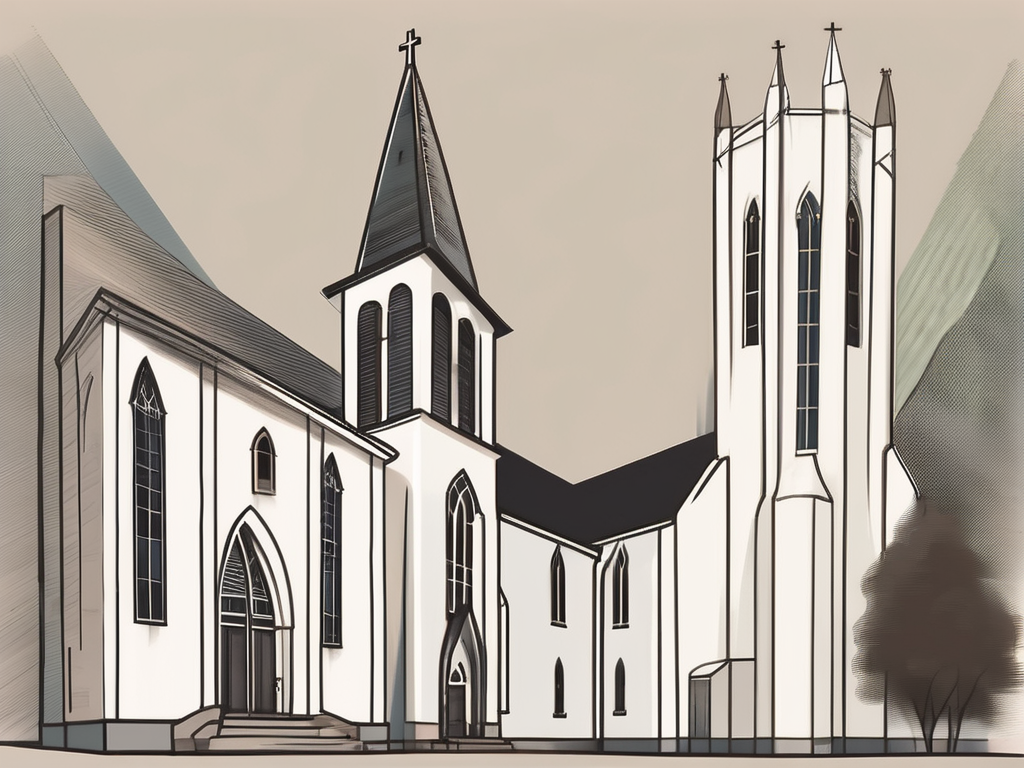The Southern Baptist doctrine is a crucial component of the Southern Baptist Church, which has a long and rich history. In order to truly comprehend its significance and influence, it is essential to delve into its historical background, fundamental beliefs, church practices, relationship with modern society, and the controversies and criticisms that surround it. This comprehensive overview aims to shed light on these key aspects and provide a deeper understanding of the Southern Baptist doctrine.
The Historical Background of the Southern Baptist Doctrine
Understanding the historical background of the Southern Baptist doctrine is vital in appreciating its development over time. The formation and early years were marked by a desire for reformation and a break from established religious traditions.
The Southern Baptist doctrine emerged as a result of significant historical events and changes, shaped by the conflicts and transformations that occurred within the church community. These events led to the establishment of distinct beliefs and practices that differentiate the Southern Baptist doctrine from other Christian denominations.
One of the key historical events that influenced the development of the Southern Baptist doctrine was the Great Awakening in the 18th century. This religious revival movement, which swept through the American colonies, emphasized the importance of personal conversion and a direct relationship with God. It challenged the traditional authority of established churches and encouraged individuals to seek salvation through their own personal experiences.
During this time, Baptist congregations in the South began to embrace the principles of the Great Awakening, which led to a significant growth in their numbers. The Southern Baptist doctrine, therefore, became deeply rooted in the revivalist spirit of the time, emphasizing the need for personal faith and individual salvation.
Another important factor that shaped the Southern Baptist doctrine was the issue of slavery in the United States. In the decades leading up to the American Civil War, the Southern Baptist Convention, the largest Baptist organization in the South, became increasingly divided over the question of slavery.
While some Southern Baptists defended the institution of slavery as consistent with biblical teachings, others, particularly those in the North, argued for its abolition. This division eventually led to the formation of separate Baptist organizations, with the Southern Baptist Convention being established in 1845 as a pro-slavery denomination.
The Southern Baptist doctrine, therefore, became closely intertwined with the defense of slavery and the preservation of Southern culture and values. This historical context had a lasting impact on the development of the doctrine, shaping its beliefs and practices in relation to social issues and cultural identity.
Over time, the Southern Baptist doctrine continued to evolve and adapt to the changing social and cultural landscape of the United States. In the late 20th century, for example, the Southern Baptist Convention experienced internal debates and divisions over issues such as women’s roles in the church and the interpretation of biblical teachings.
These debates led to a more conservative shift within the Southern Baptist doctrine, with a reaffirmation of traditional gender roles and a strict adherence to biblical literalism. This conservative stance has remained a defining characteristic of the Southern Baptist doctrine in the present day.
In conclusion, the historical background of the Southern Baptist doctrine is a complex tapestry of religious revival, social conflict, and cultural identity. It is through understanding this rich historical context that we can fully appreciate the development and distinctiveness of the Southern Baptist doctrine within the broader landscape of Christian denominations.
Fundamental Beliefs of the Southern Baptist Doctrine
At the core of the Southern Baptist doctrine lie fundamental beliefs that shape the religious convictions of its followers. Understanding these beliefs is essential in comprehending the mindset of Southern Baptists.
The Southern Baptist doctrine emphasizes the nature of God, highlighting His sovereignty, holiness, and love. Southern Baptists believe that God is the creator of the universe, and He is all-powerful, all-knowing, and present everywhere. They view God as the ultimate authority and the source of all truth.
In addition to God’s sovereignty, Southern Baptists also emphasize His holiness. They believe that God is completely separate from sin and evil, and His holiness sets Him apart from all creation. This belief leads Southern Baptists to strive for personal holiness and to live according to God’s commandments.
Furthermore, Southern Baptists believe in God’s love for humanity. They see God’s love as unconditional and sacrificial, demonstrated through the life, death, and resurrection of Jesus Christ. Southern Baptists believe that Jesus is the Son of God, fully divine and fully human, who came to earth to save humanity from sin and reconcile them to God.
Central to the beliefs of Southern Baptists is the role of Jesus Christ as the savior and the only means of salvation. They believe that salvation is a gift from God, received through faith in Jesus Christ. Southern Baptists emphasize the importance of personal faith and a personal relationship with Jesus, as they believe that salvation cannot be earned through good works or religious rituals.
The Holy Spirit plays a significant role in the process of salvation for Southern Baptists. They believe that the Holy Spirit convicts individuals of their sin, draws them to God, and enables them to have a personal relationship with Jesus Christ. Southern Baptists believe that the Holy Spirit indwells believers, empowering them to live a life that is pleasing to God and to fulfill their purpose in the world.
Moreover, Southern Baptists believe in the authority of the Bible as the inspired and infallible Word of God. They view the Bible as the ultimate source of truth and guidance for faith and practice. Southern Baptists prioritize the study and interpretation of the Bible, seeking to align their beliefs and actions with its teachings.
Overall, the fundamental beliefs of the Southern Baptist doctrine revolve around the nature of God, the role of Jesus Christ, the work of the Holy Spirit, and the authority of the Bible. These beliefs shape the religious convictions of Southern Baptists and guide them in their worship, relationships, and mission in the world.
The Southern Baptist Church and Its Practices
The Southern Baptist Church’s practices play a crucial role in shaping the religious experience of its members. These practices encompass a wide range of rituals and worship activities.
Worship within the Southern Baptist Church is characterized by a deep reverence for God and a focus on biblical teachings. Communal prayer, hymn singing, and sermons are central to their worship services. The church also plays an active role in the community, providing support and guidance to its members in times of need.
One of the key aspects of worship in the Southern Baptist Church is communal prayer. During these prayer sessions, members come together to lift their voices in supplication and thanksgiving. The act of praying together not only strengthens the bond between church members but also serves as a powerful means of seeking guidance and solace from God. It is through these collective prayers that the Southern Baptist Church fosters a sense of unity and shared purpose among its congregation.
In addition to communal prayer, hymn singing holds a special place in the worship services of the Southern Baptist Church. Hymns are carefully selected to reflect the church’s core beliefs and values, and they serve as a way for members to express their devotion and praise to God. The melodic tunes and heartfelt lyrics of these hymns create an atmosphere of spiritual upliftment, allowing worshippers to connect with their faith on a deeper level.
Furthermore, sermons form an integral part of Southern Baptist worship. These sermons are delivered by the church’s pastors, who are well-versed in biblical teachings and are responsible for guiding the congregation in their spiritual journey. Through their sermons, pastors not only provide insight into the scriptures but also offer practical advice on how to apply biblical principles to everyday life. The Southern Baptist Church places great emphasis on the power of the spoken word, believing that sermons have the ability to inspire, educate, and transform the lives of its members.
While worship is a central focus of the Southern Baptist Church, its practices extend beyond the church walls. The church actively engages with the community, seeking to make a positive impact on the lives of its members and those around them. Through various outreach programs, the Southern Baptist Church provides support and guidance to individuals and families in need. Whether it is through food drives, clothing donations, or counseling services, the church strives to embody the teachings of Christ by showing compassion and love to those who are struggling.
Moreover, the Southern Baptist Church places a strong emphasis on the importance of fellowship and community. Regular gatherings and events are organized to foster a sense of belonging and togetherness among its members. These gatherings provide opportunities for individuals to build meaningful relationships, share their joys and sorrows, and support one another in their spiritual journey. The Southern Baptist Church recognizes that true growth and transformation happen within the context of a supportive community, and it actively encourages its members to be actively involved in the lives of their fellow believers.
The Southern Baptist Doctrine and Modern Society
As society evolves, religious doctrines face contemporary issues that challenge their traditional beliefs. The Southern Baptist doctrine is no exception, as it grapples with various social and moral dilemmas.
One such issue is the Southern Baptist stance on contemporary social issues, such as gender roles, sexuality, and abortion. These stances highlight the tension between upholding traditional values and adapting to an ever-changing world. Exploring these dilemmas reveals the complexities of the Southern Baptist doctrine in modern society.
When it comes to gender roles, the Southern Baptist doctrine emphasizes the biblical teaching of complementarianism. This belief holds that men and women have distinct, complementary roles within the family and the church. Men are seen as the spiritual leaders, while women are encouraged to embrace their nurturing and supportive roles. However, in modern society, this traditional view of gender roles clashes with the growing movement for gender equality. The Southern Baptist doctrine must navigate this tension, seeking to uphold its traditional beliefs while also acknowledging the changing dynamics of gender in society.
In terms of sexuality, the Southern Baptist doctrine adheres to the biblical teaching that sexual relations are reserved for marriage between a man and a woman. This belief is rooted in the interpretation of scriptures that condemn same-sex relationships. However, as society becomes more accepting and inclusive of diverse sexual orientations, the Southern Baptist doctrine faces the challenge of engaging with individuals who identify as LGBTQ+. This requires a delicate balance between upholding traditional teachings and showing love and acceptance to all individuals, regardless of their sexual orientation.
Another significant issue that the Southern Baptist doctrine grapples with is abortion. The doctrine firmly opposes abortion, viewing it as the termination of a human life. This belief is based on the belief that life begins at conception and that every unborn child has the right to life. However, in modern society, the debate surrounding abortion is complex and multifaceted. The Southern Baptist doctrine must navigate this complexity, considering the various circumstances in which women may seek abortions, such as cases of rape, incest, or when the mother’s life is at risk. Balancing the sanctity of life with compassion and understanding for women facing difficult choices is a challenge that the Southern Baptist doctrine faces in the context of modern society.
Furthermore, the Southern Baptist doctrine also confronts issues related to race and social justice. Historically, the Southern Baptist Convention was founded in part due to its support for slavery. However, in recent years, the denomination has taken steps to address its past and promote racial reconciliation. This includes acknowledging and repenting for its historical role in perpetuating racial inequality and actively working towards racial unity within the church. The Southern Baptist doctrine must continue to grapple with these issues, seeking to promote justice, equality, and reconciliation in a society that is still grappling with the legacy of racism.
In conclusion, the Southern Baptist doctrine faces various challenges in the context of modern society. From gender roles to sexuality, abortion, and racial justice, the doctrine must navigate the complexities of these issues while upholding its traditional beliefs. As society continues to evolve, the Southern Baptist doctrine will undoubtedly continue to engage with contemporary dilemmas, seeking to find a balance between tradition and adaptation in order to remain relevant and faithful to its core principles.
Criticisms and Controversies Surrounding the Southern Baptist Doctrine
Like any religious doctrine, the Southern Baptist doctrine is not without its critics and controversies. These disputes and challenges have shaped the narrative surrounding the Southern Baptist Church.
Internal disputes and schisms have occurred within the Southern Baptist Church, highlighting differing interpretations and beliefs among its members. These divisions have led to significant debates and discussions within the community.
Furthermore, the Southern Baptist doctrine has faced public perception and criticism from external sources. These criticisms often focus on aspects such as exclusivity, gender equality, and the church’s involvement in political matters.
In conclusion, understanding the Southern Baptist doctrine goes beyond a surface-level examination. Exploring its historical background, fundamental beliefs, church practices, relationship with modern society, and the controversies surrounding it provides a more comprehensive overview. By delving into these aspects, we can gain a deeper insight into the Southern Baptist doctrine and its influence on both its followers and society as a whole.












